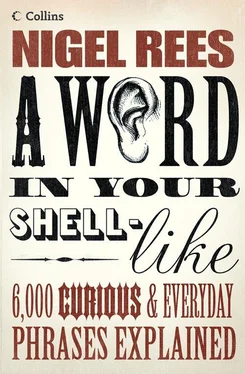at the midnight hourThe ‘midnight hour’ phrase may first have occurred in the poetry of Robert Southey. Thalaba the Destroyer (written 1799–1800, published 1801), a romance set in medieval Arabia, contains (Bk 8): ‘But when the Cryer from the Minaret / Proclaims the midnight hour, / Hast thou a heart to see her?’ Charles Lamb’s friend ‘Ralph Bigod’ [John Fenwick] in his essay ‘The two Races of Men’ (1820) has: ‘How magnificent, how ideal he was; how great at the midnight hour…’ In the same year, John Keats, ‘Ode to Psyche’, has: ‘Temple thou hast none, nor / Virginchoir to make delicious moan / Upon the midnight hours’. Keats also wrote of, ‘[Sleep] embalmer of the still midnight’, and so on. Edward Lear’s poem ‘The Dong With the Luminous Nose’ (1871) has ‘at that midnight hour’. The full phrase ‘at the midnight hour’ is a quotation from the Weston & Lee song ‘With Her Head Tucked Underneath Her Arm (She Walks the Bloody Tower)’ (1934), as notably performed by Stanley Holloway. In a speech to the Indian Constituent Assembly (14 August 1947), Jawharlal Nehru said: ‘ At the stroke of the midnight hour, while the world sleeps, India will awake to life and freedom.’ Wilson Pickett, the American soul singer, established the phrase ‘ In the Midnight Hour’ with his hit single of that title (1965).
at the psychological momentNow rather loosely used to describe an opportune moment when something can be done or achieved. It is a mistranslation of the German phrase das psychologische Moment (which was, rather, about momentum) used by a German journalist during the 1870 siege of Paris. He was thought to be discussing the moment when the Parisians would most likely be demoralized by bombardment. With or without the idea of a mind being in a state of receptivity to some persuasion, a cliché by 1900. ‘The Prince is always in the background, and turns up at the psychological moment – to use a very hard-worked and sometimes misused phrase’ – Westminster Gazette (30 October 1897); The Psychological Moment – title of a book (1994) by Robert McCrum; ‘Indeed, some would argue that the end of hanging in 1969 was the psychological moment at which we ceased to take crime as a whole seriously, putting the liberal-humanitarian “conscience” first’ – Daily Mail (27 August 1994).
at this moment in time (or at this point in time)I.e. ‘now’. Ranks with AT THE END OF THE DAY near the top of the colloquial clichés’ poll. From its periphrastic use of five words where one would do, it would be reasonable to suspect an American origin. Picked up with vigour by British trade unionists for their ad-lib wafflings, it was already being scorned by 1971: ‘What comes across vis-à-vis the non-ambulant linguistic confrontation is a getting together of defensible media people at this moment in time. I am personally oriented towards helpless laughter at the postures of these bizarre communicators’ – letter to The Times from J. R. Barnes (2 December 1971); ‘There were five similar towers…but at this moment in time, they were only of passing interest’ – Clive Eagleton, October Plot (1974); ‘The phrase “at that point of time”…quickly became an early trademark of the whole Watergate affair’ – Atlantic Monthly (January 1975); ‘At this point in time’ was described by Eric Partridge in the preface to the 5th edition of his A Dictionary of Clichés (1978) as the ‘mentally retarded offspring’ of IN THIS DAY AND AGE. ‘The Marines, of course, had other ideas, but fortune was not favouring them at this moment in time’ – R. McGowan and J. Hands, Don’t Cry for Me, Sergeant Major (1983); ‘Thoroughly agree with you about the lowering of standards in English usage on the BBC. “At this moment of time” instead of “Now” is outrageous’ – Kenneth Williams, letter of 8 October 1976, in The Kenneth Williams Letters (1994); ‘At this point in time the private rented sector of the housing market was shrinking’ – The Irish Times (8 June 1977).
attitudesSee ANGLO-SAXON.
at your throat or at your feetEither attacking you or in submissive mode. Working backwards through the citations: according to J. R. Colombo’s Popcorn in Paradise (1979), Ava Gardner said about a well-known American film critic: ‘Rex Reed is either at your feet or at your throat.’ From Marlon Brando in Playboy (January 1979): ‘Chaplin reminded me of what Churchill said about the Germans: either at your feet or at your throat.’ In fact, almost every use of the phrase tends to mention Winston Churchill. He said in a speech to the US Congress (19 May 1943): ‘The proud German Army by its sudden collapse, sudden crumbling and breaking up, has once again proved the truth of the saying “The Hun is always either at your throat or at your feet”.’ That is as far back as the phrase has been traced, though Dorothy L. Sayers, Have His Carcase , Chap. 12 (1932), has the similar: ‘Like collies – lick your boots one minute and bite you the next.’
au contraire, mon frèreSee EAT MY SHORTS.
AugustSee MAKES YOUR ARMPIT.
auld lang syneMeaning, ‘long ago’ (literally, ‘old long since’). ‘Syne’ should be pronounced with an ‘s’ sound and not as ‘zyne’. In 1788, Robert Burns adapted ‘Auld Lang Syne’ from ‘an old man’s singing’. The title, first line and refrain had all appeared before as the work of other poets. Nevertheless, what Burns put together is what people should sing on New Year’s Eve. Here is the first verse and the chorus: ‘Should auld acquaintance be forgot, / And never brought to min[d]? / Should auld acquaintance be forgot, / And days of o’ lang syne. / ( Chorus ) For auld lang syne, my dear / For auld syne, / We’ll take a cup o’ kindness yet / For auld lang syne.’ ‘For the sake of auld lang syne’ should not be substituted at the end of verse and chorus.
auntSee AGONY; MY GIDDY.
Aunt EdnaDuring the revolution in British drama of the 1950s, this term was called into play by the new wave of ‘angry young’ dramatists and their supporters to describe the more conservative theatregoer – the type who preferred comfortable three-act plays of the Shaftesbury Avenue kind. Ironically, the term was coined in self-defence by Terence Rattigan, one of the generation of dramatists they sought to replace. In the preface to Vol. II of his Collected Plays (1953) he had written of: ‘A nice, respectable, middle-class, middle-aged maiden lady, with time on her hands and the money to help her pass it…Let us call her Aunt Edna…Now Aunt Edna does not appreciate Kafka…She is, in short, a hopeless lowbrow…Aunt Edna is universal, and to those who may feel that all the problems of the modern theatre might be solved by her liquidation, let me add that…she is also immortal.’
Auntie/Aunty BBC (or plain Auntie/Aunty)The BBC was mocked in this way by newspaper columnists, TV critics and her own employees, most noticeably from about 1955 at the start of commercial television – the Corporation supposedly being staid, over-cautious, prim and unambitious by comparison. A BBC spokesman countered with, ‘An Auntie is often a much loved member of the family.’ The corporation assimilated the nickname to such effect that when arrangements were made to supply wine to BBC clubs in London direct from vineyards in Burgundy, it was bottled under the name Tantine. In 1979, the comedian Arthur Askey claimed that he had originated the term during the Band Waggon programme as early as the late 1930s. While quite probable, the widespread use of the nickname is more likely to have occurred at the time suggested above. Wallace Reyburn in his book Gilbert Harding – A Candid Portrayal (1978) ascribes the phrase to the 1950s’ radio and TV personality. The actor Peter Bull in I Know the Face, But… (1959) writes: ‘I would be doing my “nut” and probably my swansong for Auntie BBC.’ The politician Iain Macleod used the phrase when editing The Spectator in the 1960s. Jack de Manio, the broadcaster, entitled his memoirs To Auntie With Love (1967), and the comedian Ben Elton had a BBC TV show The Man from Auntie (1990–4).
Читать дальше












